Ever dreamed of becoming a sports broadcaster? Have you ever imagined yourself calling the plays during a major sporting event, and having millions of viewers listening to your every word? Well, it takes more than just enthusiastic fandom—it takes hard work, dedication and training to become a successful sports broadcaster. From college courses on broadcasting and communications to internships at local radio stations or tv networks; there is no single road map for how exactly one goes about achieving this goal, but we’ve provided some insight into what it takes. This blog post dives into various aspects that aspiring broadcasters must consider in order to get their start in this very competitive industry.
What Is a Sports Broadcaster?
Sports broadcasting is the art of delivering an entertaining, informative and captivating radio or television commentary of a live sporting event. The sports broadcaster’s job is to inform the listeners or viewers through their voice while providing additional context to help them understand what they are seeing on the screen. [1]
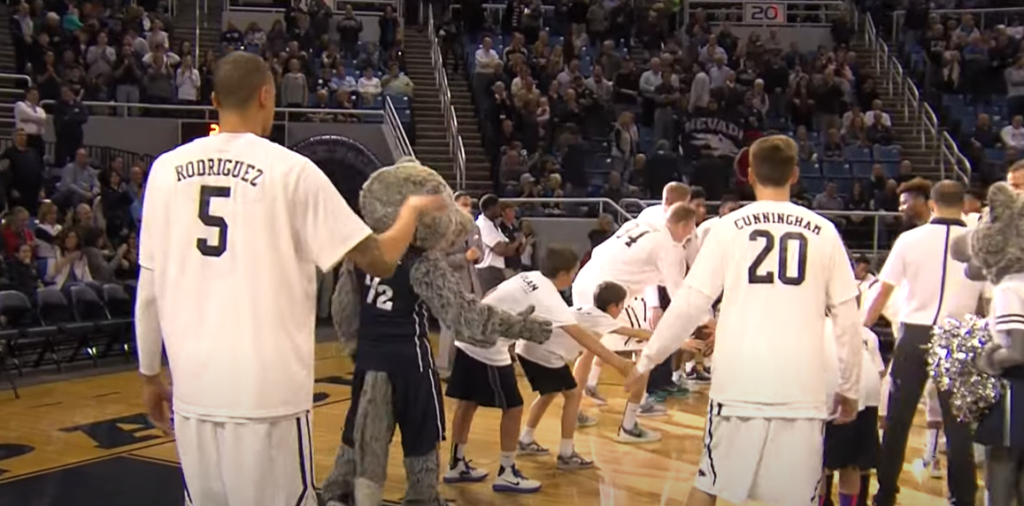
What Does a Sports Commentator Do?
A sports broadcaster specializes in commentating on sporting events. They are usually the “voice” of a team or league, providing live commentary and analysis during games. In addition to their primary role, they may also be responsible for conducting interviews with players and coaches, writing articles for publications, hosting panel discussions about sporting topics, and appearing on television programs or radio shows related to sports.
Sports broadcasters can work for television networks, radio stations and sports websites. They may also be employed as freelancers or independent contractors who provide commentary services on a contract basis. Depending on the position, they may work in either a studio environment or from the field at sporting events. Working hours vary depending on job requirements and typically include nights, weekends and holidays when games are usually held.
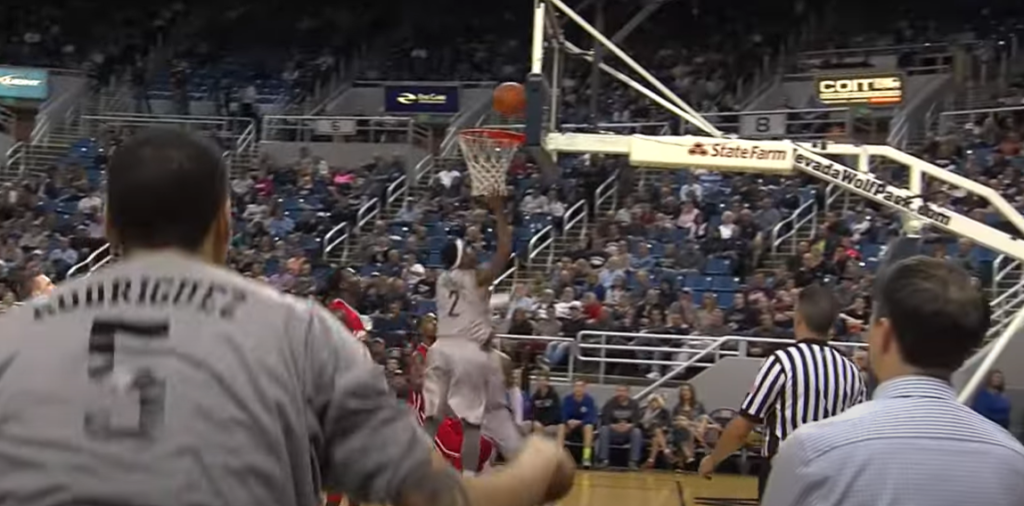
Skills Needed For Sports Broadcasting
Sports broadcasting is a unique career path and requires distinct skills. To succeed in this field, it is important to have the right qualifications and abilities.
One of the main skills required for sports broadcasting is knowledge of the game.
Being able to understand rules, strategies, and terminology is key. This means having an extensive understanding of the sport that you plan on covering as well as good research habits to stay up-to-date on news related to it. Good communication skills are also essential for sports broadcasters in order to effectively narrate events to viewers or listeners. This includes being articulate and conveying authoritative confidence when speaking about a topic or event.
Additionally, sports broadcasters must be able to think quickly on their feet and deliver spontaneous commentary. They must also be able to work well under pressure, since game time is when a broadcaster is often most visible and in the spotlight. Additionally, networking skills can be beneficial for this field, as broadcasting opportunities may come through meeting contacts at different sporting events.
Finally, having technical experience or knowledge of audio-visual equipment will help sports broadcasters understand how to set up the necessary equipment effectively and make sure that sound and video feed are reliable during broadcasts. This can be especially important if they plan on running their own shows or working remotely. With these skills combined, a career in sports broadcasting can be possible. [2]
How To Become a Sports Broadcaster
Get Your Bachelor’s Degree
If you hope to become a sports broadcaster, the first step is to get a bachelor’s degree. While it may be possible to break into this career without a college education, most employers prefer candidates who have at least a four-year degree in broadcast journalism or communications.
Get Experience
In addition to having a college degree, you’ll also need to have some experience in the field. This can include amateur sports broadcasting, internships at local radio or television stations, or even taking classes related to sports broadcasting. Having work experience will help you stand out from other job applicants.

Develop Your On-Air Persona
As a sports broadcaster, it’s important to develop your own unique on-air persona. This includes practice speaking into a microphone and writing scripts for broadcasts. You should also be familiar with the terminology of the sport that you are covering. [3]
Learn About Sports Production Techniques
If you want to become a successful sports broadcaster, you’ll need to know about production techniques such as how to create audio effects, edit video, and create graphics. Knowing how to use these tools is essential for a successful broadcast.
Keep Up With Current Events in the Sports World
Staying up-to-date with happenings in the sporting world is an important part of being a sports broadcaster. This includes following trends in the industry, reading about upcoming events, and talking to players and coaches. Doing your research will help you be more informed when it comes time to comment on games or athletes.
Obtain Accreditation From Professional Organizations
Another important step towards becoming a sports broadcaster is obtaining accreditation from professional organizations such as the National Association of Sportscasters and Broadcasters (NASB). This accreditation demonstrates that you have the necessary skills and knowledge to work in the industry.
Network With Other Sports Broadcasters
Once you have obtained a degree and experience, networking with other professionals in the field is essential for finding job opportunities. You can join professional organizations, attend events, and take advantage of social media to make connections with other sports broadcasters.
Practice Your Presentation Skills
Practice your on-air presentation skills by recording yourself or participating in radio or television shows as a guest host or commentator. This will help you become comfortable speaking into a microphone and give you an idea of how you sound to listeners or viewers. It’s also a great way to get feedback from experienced professionals who can offer advice on improving your craft. [4]
Complete An Internship
Completing an internship at a local radio or television station is another great way to get experience in the field and find job opportunities once you’ve graduated. Many employers prefer candidates who have had hands-on experience in broadcasting. An internship will also give you a chance to make important connections within the industry, which can help you build your career later on. Additionally, internships are an excellent way to gain knowledge of sports production techniques, as well as insights into how the business works from experienced professionals. This can be invaluable for early career success.
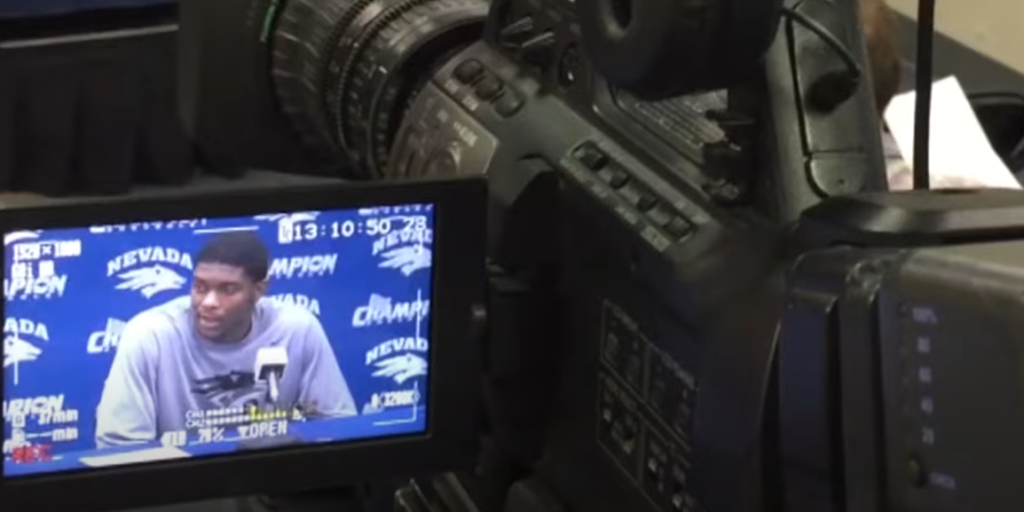
Create A Demo Tape
Creating a demo tape of your best work is an important step in finding a job as a sports broadcaster. This should include clips from radio or television shows that you have worked on, as well as some of your written work. Having a demo tape will give employers an idea of what kind of broadcaster you are and can help set you apart from other applicants.
Apply At Local News And Radio Stations
Once you have all of the necessary qualifications and experience, it’s time to start applying for jobs. Look in your area for local radio or television stations that are recruiting sports broadcasters. You may also want to apply at larger news networks if you have the right credentials.
Hire An Agent
Finally, consider hiring an agent to help you find job opportunities. An agent can serve as your advocate and make sure that companies know of your qualifications and experience. They can also negotiate employment contracts on your behalf.
By following these steps, you’ll be well on your way to becoming a successful sports broadcaster. With the right education, experience, and networking skills you can reach your goal of being a professional in the industry. [5]
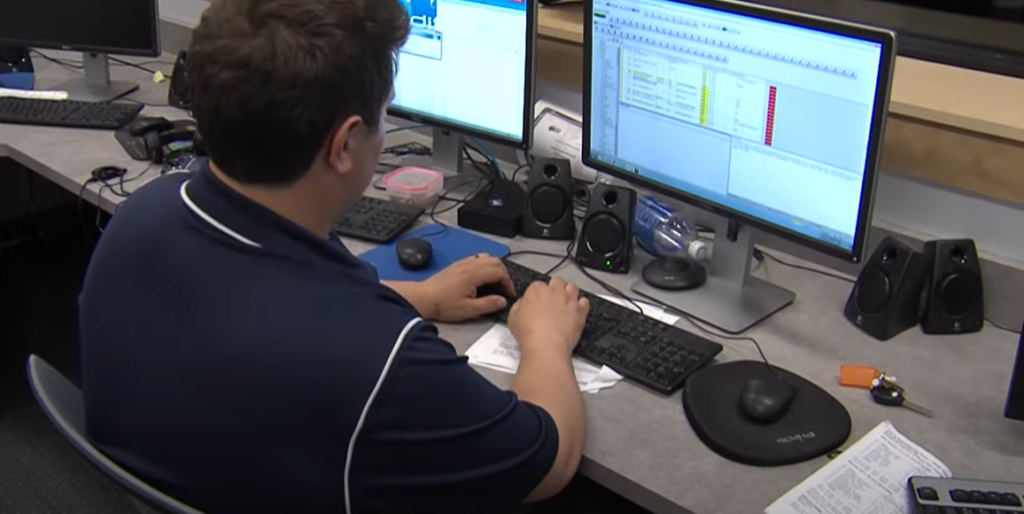
How Much Can You Expect to Earn?
The salary of a sports broadcaster varies greatly depending on experience, the type and size of job, and geographic location. Entry-level salaries at small stations range from $18,000 to $25,000 per year. Experienced broadcasters working in major markets can command between $50,000 and $150,000 annually. Many successful sports broadcasters are able to supplement their income by appearing in television commercials or hosting public events during off-hours.
Some may also operate their own production companies or work as freelance commentators for more than one station. Generally speaking, however, the most lucrative broadcasting jobs are available only to those with extensive experience and an established track record of success.
Ultimately, a career in sports broadcasting can be financially rewarding for those with the right combination of skill, drive and ambition. With hard work and dedication, you could soon find yourself at the center of all the action – making sure that your viewers stay informed about their favorite teams and athletes. It’s an exciting job that offers great rewards both professionally and personally. [5]
Internship Opportunities
One way to help you get a job in sports broadcasting is through internships. Internships can provide invaluable experience and help build the connections you need for future jobs. Look for programs at local TV stations, radio broadcasters, or newspapers. Even if the internship is unpaid, it will be worth your time as it provides valuable hands-on training and one-on-one mentoring from experienced professionals. If you’re still in school, make sure to take advantage of any opportunities offered by your college or university.
You may also want to consider attending conferences related to broadcasting and networking with professionals in the industry. With a good portfolio of work under your belt, potential employers will be more likely to give you an opportunity when positions open up.
Be persistent and confident in your skills, and don’t be afraid to follow up with employers or contacts you made during the internship period. Remain positive and optimistic about finding a job in sports broadcasting – if it’s something you want to do, don’t give up! With dedication, hard work and the right opportunity, you can make a career out of sports broadcasting.
More About a Degree You Need To Be A Sports Broadcaster
To become a sports broadcaster, one needs to have an academic qualification in broadcasting or communication. Most employers will prefer candidates who possess at least a bachelor’s degree in broadcast journalism, communications, or another related field. While studying for the degree, it is important to pay special attention to courses such as media studies, scriptwriting, video production and editing, radio production and television production. Additionally, many universities offer specialized courses specific to sports broadcasting that can help equip students with the necessary knowledge and skills required for success in this profession.
Apart from formal education, aspiring broadcasters should also develop additional skills such as speaking clearly and written communication proficiency. Additionally, they should be knowledgeable about several different sports so that they can provide accurate analysis of games. Furthermore, having good people skills and the ability to work well with others is important for this profession as broadcasters often have to interact with athletes, coaches and other individuals involved in the sports industry.
Tips for a Successful Sports Broadcasting Career
- Get Educated: An educational background in broadcasting and/or journalism is essential for a successful career as a sports broadcaster. A bachelor’s degree in broadcast communication, media studies, or a related field can help you gain the skills required to excel in the profession.
- Gain Experience: Internships are great opportunities to gain experience in the industry and learn from experienced professionals. You might also consider volunteering at your local radio station or school newspaper to get hands-on experience of producing content and working with audio equipment.
- Build Your Network: Building relationships in the industry is key for making connections that could lead to job opportunities. Attend relevant workshops, events, or seminars and network with people who make decisions in the sports broadcasting industry.
- Prepare for Auditions: When you’re ready to start looking for jobs, it is important to prepare for auditions that could require reading scripts, speaking on a microphone and or improvising. Practice your delivery and ensure you have a good command of language, grammar and pronunciation.
- Keep Up-To-Date: As a sports broadcaster, staying informed about current events in the sporting world is essential. Follow relevant news sites and join professional networks or forums so that you can be up-to-date with the latest developments in the field.
- Stay Positive: Most importantly, remain positive throughout your journey as a sports broadcaster. Things may not always go as planned, but it’s important to stay motivated and keep trying. With the right attitude and dedication, you can achieve your dream of becoming a successful sports broadcaster. [7]
What Are Some Related Alternative Careers?
In addition to a sports broadcaster, there are many other careers in the media and broadcasting industry related to sports. Jobs such as sportscaster, sport analyst, commentator, producer, director, sportswriter or journalist can all involve covering sports events and providing commentary on them.
Some of these jobs require more technical knowledge than others do. For instance, a producer is usually responsible for overseeing the production of video content related to sports. They have to have knowledge about editing software and audio equipment used in production studios. A director must be able to create compelling visuals by managing camera angles and coordinating with multiple crew members during live broadcasts.
No matter what role someone is interested in pursuing within the media industry related to sports, they will need some combination of technical knowledge, writing/storytelling skills, and understanding of sports-related statistics and trends. With proper training and experience, any of these jobs can offer a rewarding career.
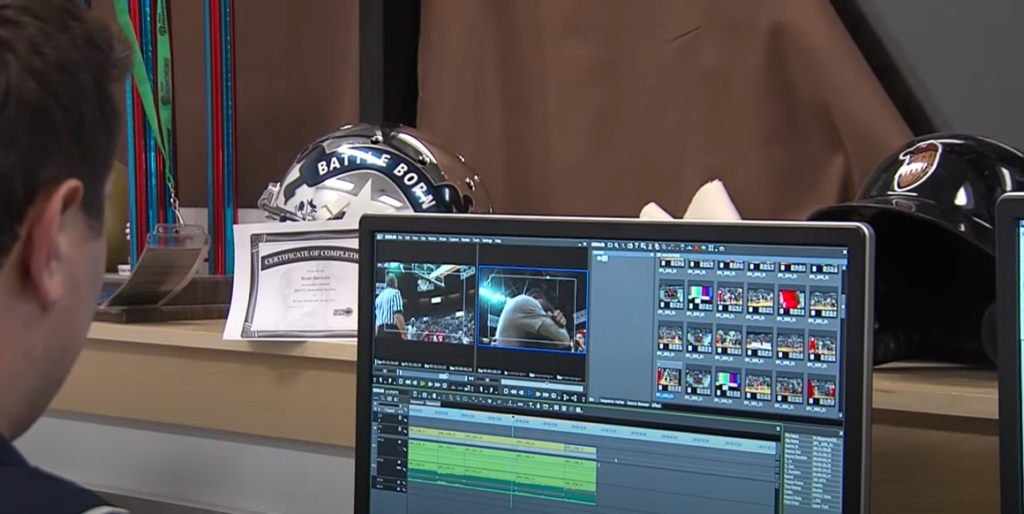
Path to the Sports Broadcast Booth: How to Become a Sports Broadcaster
Embarking on a career in sports broadcasting is an exciting journey. Here’s a comparison of the steps to become a sports broadcaster, along with the necessary education and key skills.
| Steps | Education | Key Skills |
|---|---|---|
| Earn a Bachelor’s Degree | A bachelor’s degree in journalism, communications, or broadcasting provides a solid foundation. | Excellent communication, writing, and on-air presentation skills. |
| Build a Portfolio | Gather experience through internships, campus radio, or local sports broadcasting. | Play-by-play announcing, interviewing, and knowledge of sports. |
| Network and Gain Experience | Connect with professionals in the industry and volunteer for local sports events. | Adaptability, ability to work under pressure, and a strong sports network. |
| Pursue Advanced Degrees (Optional) | Advanced degrees in sports journalism or related fields can enhance credentials. | Research skills, multimedia production, and in-depth sports knowledge. |
| Apply for Entry-Level Positions | Seek entry-level roles like sports reporter, producer, or radio announcer. | Attention to detail, teamwork, and knowledge of broadcasting equipment. |
Explanation of the Table:
- Steps: Lists the key steps to pursue a career in sports broadcasting.
- Education: Highlights the relevant educational background required for this profession.
- Key Skills: Identifies the essential skills and qualities needed to excel as a sports broadcaster.
Becoming a sports broadcaster begins with earning a bachelor’s degree in fields like journalism or communications, coupled with strong communication and presentation skills. Building a portfolio by gaining experience in internships and campus activities is crucial. Networking and gaining experience through volunteering and local events can open doors.
Advanced degrees are optional but can provide a competitive edge. Applying for entry-level positions, such as sports reporter or producer, allows you to refine your skills and work with broadcasting equipment.
Ultimately, a successful sports broadcaster possesses a unique blend of education, experience, and skills to captivate audiences with their sports coverage.
FAQ
What degree is best for sports broadcasting?
The best degree for sports broadcasting depends on what career path you want to pursue. If you are interested in working as a professional radio or television sports broadcaster, then it is recommended that you have a degree in broadcast journalism or communications. If you’re more interested in working behind the scenes as an executive producer, then a degree in business, management, marketing or sales might be more effective. Additionally, if your goal is to become an analyst or commentator on sports broadcasts, then a degree in history, statistics, economics or physical education may be beneficial.
What skills do I need to become a successful sports broadcaster?
Successful broadcasters must possess excellent communication and interpersonal skills. They should have a good command of the language they’re using and be able to convey their messages in a clear, concise manner. Knowledge of the sport being broadcasted is essential as well, so familiarity with the rules, players and other aspects of the game can be helpful. Lastly, sports broadcasters must have good research skills and an understanding of journalism ethics.
What are some common job titles for sports broadcasters?
Sports broadcasters may hold various positions such as reporter, anchor or play-by-play announcer. Some other roles that a broadcaster might have include sideline reporter, radio host or even podcast producer. Ultimately, the position you pursue will depend on your desired career path and what opportunities are available in your area.
What is the average salary range of a sports broadcaster?
The exact salary of a sports broadcaster will vary depending on job title, experience and location. Generally speaking, the median annual wage for radio and television announcers was $30,240 in 2019. Salaries can range from as low as $18,590 up to about $71,650 with the top 10% earning more than $103,400 per year. Additionally, some broadcasters may receive additional income from hosting events or appearing at promotional activities.
What are common responsibilities of a sports broadcaster?
Sports broadcasters typically have various duties such as interviewing athletes and coaches; researching game statistics; creating scripts for their broadcasts; attending press conferences and other media events; reporting live from stadiums or arenas; producing commentary segments for their broadcasts; providing analysis on games or players; and writing stories for newspapers, magazines or websites. It is also important for sports broadcasters to stay up-to-date with current events in the sports world so they can provide accurate information to their viewers.
Where do most sports broadcasters go to college?
There are many great colleges and universities that offer degree programs geared towards sports broadcasting. In the United States, some of the most popular colleges for aspiring broadcasters include Syracuse University, University of Missouri, Arizona State University, Penn State University and Northwestern University. Additionally, there are also several online programs available that may be a good option if you’re unable to attend classes in person.
What are the qualifications of a broadcaster?
To become a sports broadcaster, you need to have excellent communication skills and the ability to think quickly. You also need to be knowledgeable about the sport you are commenting on. Additionally, many employers require applicants to have a degree in broadcasting, communications, journalism or another related field. It is also helpful if you have had experience in writing news stories, hosting shows or doing play-by-play commentary for sporting events.
How important is networking in becoming a sports broadcaster?
Networking is crucial in the sports broadcasting industry. Building relationships with professionals, including mentors, coaches, and colleagues, can open doors to opportunities. Attend industry events, join broadcasting organizations, and seek internships to expand your network.
What is the role of internships in a sports broadcasting career?
Internships provide valuable hands-on experience in sports broadcasting. They allow you to work with professionals, learn the ropes, and build a portfolio. Look for internships with local sports radio stations, TV channels, or online platforms to gain practical skills.
How do I improve my on-air presence as a sports broadcaster?
Improving your on-air presence requires practice and feedback. Record your broadcasts, analyze them for strengths and weaknesses, and seek constructive criticism. Consider voice training and public speaking courses to enhance your delivery and confidence.
What are the steps to developing a unique broadcasting style?
Developing a unique broadcasting style takes time. Study different broadcasters to understand their techniques and find inspiration. Experiment with various delivery styles until you discover what suits you best. Authenticity is key in connecting with your audience.
How do I stay updated on sports news and events as a broadcaster?
Staying informed about sports news and events is vital. Follow various sports, read sports news outlets, watch games, and engage with online communities. Building a comprehensive knowledge base will help you provide insightful commentary and analysis.
What is the role of social media in a sports broadcaster’s career?
Social media is a powerful tool for sports broadcasters. Use platforms like Twitter, Instagram, and YouTube to share your insights, connect with fans, and promote your work. Building a strong online presence can help you gain visibility in the industry.
How can I prepare for live broadcasts and commentary?
Preparing for live broadcasts requires thorough research. Study the teams, players, and upcoming events. Create notes and talking points to refer to during the broadcast. Practice your commentary skills through mock broadcasts and rehearsals.
What are the opportunities for specialization in sports broadcasting?
Sports broadcasting offers various specialization options. You can focus on a specific sport, become a play-by-play announcer, color commentator, sideline reporter, or studio analyst. Identifying your niche and honing your expertise can set you apart in the field.
How do I handle the pressure of live broadcasts as a sports broadcaster?
Handling the pressure of live broadcasts takes practice and mental preparation. Develop strategies to stay calm under pressure, such as deep breathing exercises and visualization techniques. Embrace mistakes as learning opportunities and strive for continuous improvement.
What is the importance of building a portfolio as a sports broadcaster?
A portfolio showcases your work and talents to potential employers. Include samples of your broadcasts, commentary, and analysis. A well-organized portfolio can help you demonstrate your skills and secure job opportunities in sports broadcasting.
Useful Video: So, you want to be a sports broadcaster?
Conclusion
Becoming a sports broadcaster is not easy, but with hard work and dedication it can be done. All aspiring sports broadcasters should take the necessary steps to reach their goal as outlined in this article—from completing an education in broadcasting or journalism to gaining experience in radio production and marketing yourself as a professional broadcaster. With the right contacts, portfolio of work, and knowledge of the industry, anyone can become a successful sports broadcaster.
Good luck!
References:
- https://nationalcareers.service.gov.uk/job-profiles/sports-commentator
- https://www.indeed.com/career-advice/career-development/how-to-become-a-sports-broadcaster
- https://www.ucfb.ac.uk/your-career/careers-in-football-and-sport/career-prospects-in-sports-broadcasting/
- https://learn.org/articles/Sports_Broadcaster_Become_a_Sports_Broadcaster_in_5_Steps.html
- https://careerhub.students.duke.edu/blog/2022/12/30/how-to-become-a-sports-broadcaster-what-you-need-to-know/
- https://www.dean.edu/news-events/dean-college-blog/story/become-sports-commentator/
- https://www.gcu.edu/blog/language-communication/becoming-a-sports-broadcaster





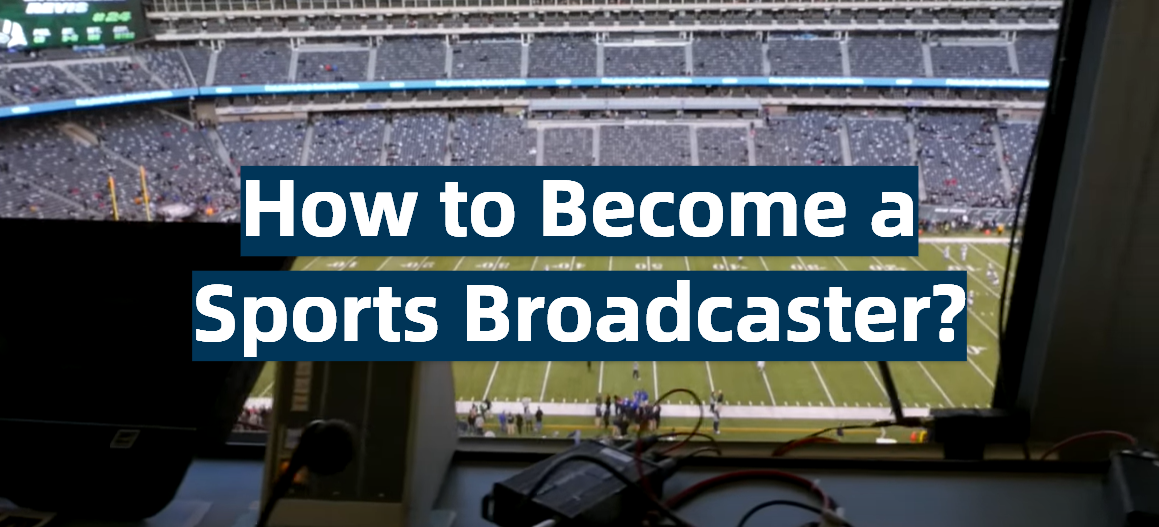



Leave a Review